The second week of the Parliament Winter Session began with little progress as both Houses of Parliament witnessed adjournments amidst fervent protests by Opposition members. Demands for discussions on issues ranging from allegations against the Adani Group to the ongoing situation in Manipur dominated proceedings, leaving the day largely unproductive.
A Week of Disruptions Continues
The Lok Sabha and Rajya Sabha convened on December 2, 2024, only to be adjourned without addressing substantial business. This marked the continuation of a week marred by disruptions. The Opposition, united under the INDIA bloc, remains steadfast in its insistence on prioritizing these pressing issues for discussion.
Focus on Adani Allegations
In the Lok Sabha, Congress MP Manickam Tagore submitted an adjournment motion notice calling for an urgent investigation into allegations made by the U.S. Justice Department against Gautam Adani. The allegations, centered on bribery and corruption, have triggered a political firestorm in India. Tagore emphasized the need to address these claims in the “public interest,” urging immediate parliamentary debate.
Manipur and Law-and-Order Issues Dominate Rajya Sabha
Meanwhile, in the Rajya Sabha, several leaders raised adjournment and suspension notices to discuss critical issues:
- Manipur Violence: DMK MP Tiruchi Siva sought attention on the ongoing violence in Manipur, emphasizing the need for parliamentary intervention in the crisis.
- Delhi’s Law-and-Order Concerns: AAP MP Sanjay Singh filed a notice under Rule 267 to address the deteriorating law-and-order situation in the national capital.
- Arrest of ISKCON Monks in Bangladesh: AAP MP Raghav Chadha highlighted the arrest of ISKCON monks, calling for a dedicated discussion on the implications of these events.
Opposition Strategies: Seeking the Speaker’s Intervention
In a significant move, floor leaders of the INDIA alliance convened a meeting at the Congress Parliamentary Party office under the leadership of Rahul Gandhi, Leader of Opposition in the Lok Sabha. After deliberations, the leaders decided to approach the Speaker to seek his intervention in ensuring the smooth functioning of Parliament.
The INDIA bloc’s united front underscores its commitment to holding the government accountable on issues that it deems critical for the nation.
Persistent Deadlock
Despite multiple attempts to bring order to proceedings, the Parliament’s Winter Session continues to face a deadlock. The lack of productive debate over essential matters has drawn criticism from various quarters, with analysts noting the need for collaborative efforts to ensure parliamentary efficiency.
A Long Road Ahead
As the Winter Session progresses, it remains to be seen whether a breakthrough can be achieved. The growing list of unresolved issues, combined with intensifying Opposition demands, sets the stage for potentially contentious debates in the days to come.
With public interest and national concerns hanging in the balance, all eyes are on how both Houses navigate the current impasse. Will the government and Opposition find common ground, or will the session continue to be overshadowed by disruptions? The answers will shape the trajectory of this critical parliamentary season.


















